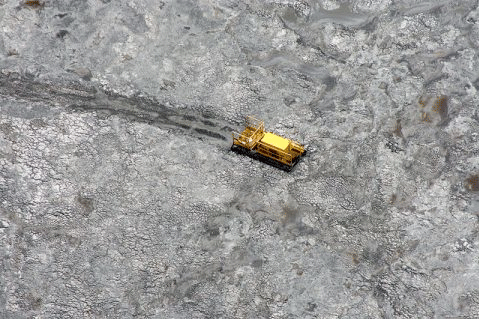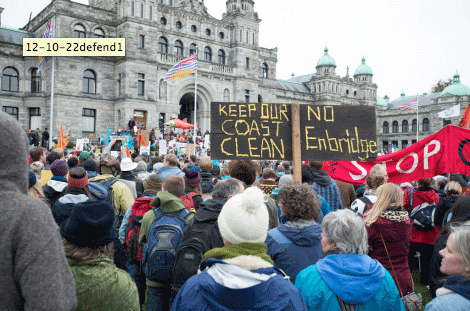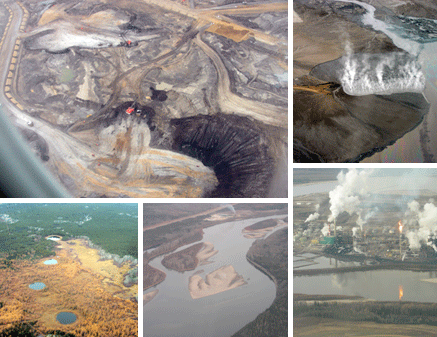First Nation Challenges Expansion of Canada’s Tar Sands
Air Date: Week of October 26, 2012

Canadian Tar Sands. http://sierraclub.typepad.com/compass/tar-sands/
Canada’s tar sands cover an area the size of New York State. Now Shell Canada wants to expand its Jackpine tar sands mining operations, but several First Nations communities who live there fiercely protest the plans. Living on Earth host Steve Curwood hears why from Chelsea Flook, Executive Director of the Sierra Club Prairie Chapter.
Transcript
CURWOOD: From the Jennifer and Ted Stanley Studios in Boston, this is Living on Earth. I'm Steve Curwood. The tar sands of Canada are so rich the nation's second only to Saudi Arabia for proven crude oil reserves. One of the companies developing the sands, Shell Canada, wants to expand its operations. But this region is also home to several indigenous First Nations communities who fiercely protest Shell’s plans.
The Athabasca Chipewyan First Nation - ACFN - has challenged the expansion plans in court. Chelsea Flook is Executive Director of the Sierra Club Prairie Chapter - welcome to Living on Earth.
FLOOK: Hello, thanks for having me!
CURWOOD: Now tell me, the First Nation objects to Shell’s plans to expand its Jackpine tar sands mine, why?
FLOOK: Well, the complaints are numerous. It stems back to the earlier Jackpine mine where Shell made an agreement with the Athabasca Chipewyan First Nation on mitigating impacts. And Shell, according to ACFN, has broken that agreement. When it comes time to making a decision on the new project, how can the First Nation expect any of its concerns to be addressed when, even when you sign a deal with the exact same company, that they don’t honor those agreements?

Enthusiastic crowd on the steps of the BC legislature in Victoria, protesting tar sands pipelines, tankers, and the threats they pose to the west coast.
CURWOOD: Well, what are they saying didn’t happen, I mean, what does it actually look like up there?
FLOOK: The Shell project is open top mining - the new expansion requires mining out 21 kilometers of the Muskeg River, which is, you know, aside from mining the river and all of the environmental impacts, there are all kinds of cultural significance of that area of the river to the Athabasca Chipewyan First Nation people. So they are saying ‘no’ to this project, and they want to be able to assert that right to say no, as it’s been enshrined in the treaty rights and constitutional protections, and that’s why they’re raising this case now.
CURWOOD: So, the First Nation argues that it would be illegal for the Canadian government to give the OK to expand these tar sands and mines, what’s the legal basis for that?
FLOOK: Well, the legal basis stems back to treaty rights between the Crown and treaty peoples - the first peoples of this land. Those agreements were enshrined in the constitution when Canada brought the constitution home, and it was sort of written in under section 35 that treaty rights people and indigenous people of this land have special constitutional considerations, for development of their land, for any kind of disturbance of their land, and it really tried to enshrine the idea that… so long as the grass grows, and the river flows, and the sun shines, that the people can be there time immemorial.
So parts of these projects are having such massive impacts on the land, on the water, on the wildlife – that people are still dependent on – and so they are seeing more and more that their medicines are disappearing, the water levels are getting lower, they’re not sure if it’s safe to eat the fish or drink the water.
They’re finding moose and other animals that they eat with various tumors and lesions and things, and so the basis for them saying ‘no’ to this is that it’s constitutionally enshrined for them to do so, however, we have a federal government that’s pretty much hell-bent on developing these things, pretty much at any and all costs.
CURWOOD: So, if I understand you correctly, this treaty was made with the Crown, in other words – well, that must have been Queen Victoria of England, this was more than 100 years ago.

Alberta Tar Sands – In Photos. Top left - Overhead of mining operation, top right - tar sands tailings, lower left - sink holes of the McClelland Lake Wetland Complex, lower middle - the low flow of the Athabasca River, and lower right - oil sands upgrader. Photos by Lindsay Telfer.
FLOOK: Yes. And so part of that process was when Canada made its own constitution separate from the British Constitution, part of what was written into it was the recognition that there were past agreements and that they were going to do their best to honor those agreements.
This, however, you know, is running up against the history of various pieces of legislation like the Indian Act, which restricted status, it didn’t let native people vote, it restricts many things about their lives... they have to have status cards, and Canada has a long history of residential school systems where they sought to literally ‘kill the Indian in the child,’ as it was said in the original documents.
So, there’s this long process where there’s a cultural and very historical genocide that’s happening against these people where if you can take them off their land, if you can displace them from practicing their traditional ways, then those treaty-like rights no longer exist.
CURWOOD: Now, how is the Canadian government reacting to the First Nation’s case regarding these tar sands?
FLOOK: They are there as interveners, they are also there as the judge, jury, and executioners of the whole project, so they have a little bit of a conflict of interest, in our opinion. One of the former ministers, Jim Prentice, who left his post, he penned a letter to our mainstream media here in Canada saying, you know, the duty to consult has not been met in these projects.
And that leaves a lot of these projects open to a lot of financial risk, and this has basically exposed the public to a lot of this risk, because, if in fact these treaty rights are pushed forward, and those people do push for them to be respected, then a lot of those land leases mean that the public would have to reimburse these companies for the land leases that they purchased illegitimately.
CURWOOD: What does this situation mean now for the future of resource development and indigenous people’s rights in Canada?
FLOOK: Well, I think that there’s been a couple test cases at the Supreme Court level where various communities have asserted their rights and taken it all the way to the Supreme Court. And Supreme Court has left things open to rulings, very much so, that would favor the ACFN in this case.
So I think that this could really set a precedent in the tar sands region alone, for more and more of these communities to stand up to these major oil companies and expect that their voices will be heard.
CURWOOD: Chelsea, what’s the best possible outcome from this from your perspective?
FLOOK: Well, I think that the best possible outcome from our perspective at Sierra Club would be that we see a First Nation asserting its rights to say ‘no’ to a project, and that that would get respected. It’s also enshrined in the UN Declaration of the rights of indigenous peoples to say ‘no’ to these projects with free, prior, and informed consent.
So I think that Canada has at least a moral obligation to look at itself and look at the UN declaration, and start taking meaningful action on those moral imperatives. So that’s our hope there, and if it just so happens that First Nations are deciding that they want to protect their land and their way of life, then there are environmental benefits to that as well.
CURWOOD: Chelsea Flook is the Executive Director of the Sierra Club Prairie Chapter in Edmonton, Alberta. Thanks so much for taking the time, Chelsea!
FLOOK: Alright, thanks so much for having me!
CURWOOD: In published reports, Shell Canada said that, though expanding would cause substantial habitat loss, it has extensive plans to mitigate the damage.
The Canadian Government did not reply to numerous requests for comment before we recorded our show, but sent a statement later, saying there are 2 separate mandated independent environmental review panels and "The Government trusts that the joint review panels will receive and consider information from Aboriginal groups related to how these projects may affect potential or established Aboriginal and treaty rights before they issue their reports."
Links
The Alberta government’s website about Alberta’s Oil Sands
The Sierra Club. The Dirty Truth About Canada’s Tar Sands Industry
Living on Earth wants to hear from you!
Living on Earth
62 Calef Highway, Suite 212
Lee, NH 03861
Telephone: 617-287-4121
E-mail: comments@loe.org
Newsletter [Click here]
Donate to Living on Earth!
Living on Earth is an independent media program and relies entirely on contributions from listeners and institutions supporting public service. Please donate now to preserve an independent environmental voice.
NewsletterLiving on Earth offers a weekly delivery of the show's rundown to your mailbox. Sign up for our newsletter today!
 Sailors For The Sea: Be the change you want to sea.
Sailors For The Sea: Be the change you want to sea.
 The Grantham Foundation for the Protection of the Environment: Committed to protecting and improving the health of the global environment.
The Grantham Foundation for the Protection of the Environment: Committed to protecting and improving the health of the global environment.
 Contribute to Living on Earth and receive, as our gift to you, an archival print of one of Mark Seth Lender's extraordinary wildlife photographs. Follow the link to see Mark's current collection of photographs.
Contribute to Living on Earth and receive, as our gift to you, an archival print of one of Mark Seth Lender's extraordinary wildlife photographs. Follow the link to see Mark's current collection of photographs.
 Buy a signed copy of Mark Seth Lender's book Smeagull the Seagull & support Living on Earth
Buy a signed copy of Mark Seth Lender's book Smeagull the Seagull & support Living on Earth

